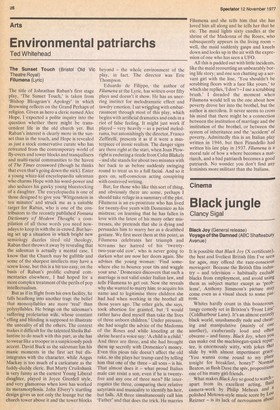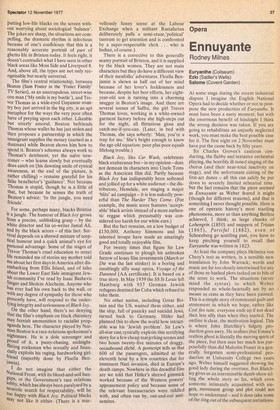Cinema
Black jungle
Clancy Sigal
Black Joy (General release) Voyage of the Damned (ABC Shaftesbury Avenue) It is possible that Black Joy (X certificate), the best and liveliest British film I've seen for ages, may offend the race-conscious moviegoer. Because the British film industry — and television — habitually exclude blacks from employment, and avoid using them as subject matter except as 'problems', Anthony Simmons's picture nig come even as a visual shock to some patrons.
Whites hardly count in this boisterous, tangy comedy set in Brixton's 'Front Line (Coldh arbour Lane). It's an almost entirelY black world, unashamedly rude and cheat' ing and manipulative (mainly of one another), exuberantly loud and often obscene — and funny. Black Joy, when you can make out the machinegun-quick repar • tee, is enormously witty, with jokes that slide by with almost impertinent grace. 'You wanna come round to my place tonight for breakfast, honey?' Norman Beaton, as flash Dave the spiv, propositions one of his many girl-friends. What makes Black Joy so good to watch apart from its excellent acting, fluid camera-work by Philip Meheux and polished Motown-style music score by I-0 Reizner — is its lack of nervousness about putting low-life blacks on the screen without worrying about sociological 'balance'. The jokes are sharp, the situations are compelling, the dramatic rhythm is infectious because of one's confidence that this is a reasonably accurate portrait of part of ghettalife in Brixton today. It feels right, it doesn't contradict what I have seen in other black areas like Moss Side and Liverpool 8. And, above all, the types are not only recognisable but nearly universal.
The film's central relationship, between Beaton (Sam Foster in the 'Foster Family' TV Series), as an unscrupulous, street-wise con man (`My smile is my hustle'), and Trevor Thomas as a wide-eyed Guyanese country boy just arrived in the big city, is an apt metaphor for the ways the very poor often have of preying upon each other. Likeable but utterly amoral, Beaton befriends Thomas whose wallet he has just stolen and then proposes a partnership in which the Immigrant supplies the money (earned as a dustman) while Beaton shows him how to spend it. Beaton's schemes always work to Thomas's detriment, yet the naïve newcomer — who learns slowly but eventually does catch on (his dawning smile of cynical awareness, at the end of the picture, is rather chilling) — remains grateful for his false benefactor's 'guidance'. Not because Thomas is stupid, though he is a little of that, but because he senses the truth of Beaton's advice: 'In the jungle, you need friends'.
. For some, perhaps many, blacks Brixton is a jungle. The humour of Black Joy grows from a precise, unblinking grasp — by the White director and his co-writer Jamal Ali, and by the black actors — of this fact. Survival depends on a shrewd mixture of sceptical humour and a quick animal's eye for Personal advantage. Some of the stages of Trevor Thomas's cruel education to street life reminded me of stories my mother told me about her first days in America after disembarking from Ellis Island, and of tales about the Lower East Side immigrant Jewish community I've read by Isaac Bashevis Singer and Sholem Alecheim. Anyone who has ever had his own back to the wall, or With any degree of sympathy for those who Presently have, will respond to the underlYing integrity and seriousness of Black Joy. On the other hand, there's no denying that the film's emphasis on black chicanery may furnish ammunition to racialist propaganda here. The character played by Nor an Beaton is a race-relations spokesman's nightmare. He is a dole scrounger and Proud of it, a pussy-chasing, midnightflitting cocksman who sexually and financially exploits his raging, hardworking girlfriend (superbly done by Floella Benjamin).
I. do not imagine that either the National Front, with its blood-and-soil hang, uPs, or the Government's race relations tc'hhY, which has always been paralysed by a neurotic search for respectability, will be too happy with Black Joy. Political blacks May not like it either. (There is a mar vellously funny scene at the Labour Exchange when a militant Rastafarian deliberately pulls a semi-craze,`political' tantrum to get attention and is confronted by a super-respectable clerk . who is Indian, of course.) There is a corrective to this generally seamy portrait of Brixton, and it is supplied by the black women. They are not main characters but they do have a different view of their menfolks' adventures. Floella Benjamin is shown as half out of her mind because of her lover's fecklessness and because, despite her best efforts, her eightyear-old son is turning into a charming mugger in Beaton's image. And there are several scenes of Saffra, the girl Trevor Thomas loves, working in a white-owned garment factory before she high-steps out for the night, all flirtatious gloss and catch-me-if-you-can. (Later, in bed with Thomas, she says soberly: 'Man, you're a trap for me.' She's bright enough to know the age-old equation: poor plus poor equals lifelong trouble,) Black Joy, like Car Wash, celebrates black exuberance but— in my opinion —does not demean its characters into Uncle Toms as the American film did. Partly because Black Joy has indisputably been softened and jollied up for a white audience — the distributors, Hemdale, are staging a major 'blitz' ad campaign — it is less nakedly powerful than The Harder They Come. (For example, the music score features 'acceptable' black artists instead of a more authentic reggae which presumably was considered too harsh for our white ears.) But the fact remains, on a low budget of £150,000, Anthony Simmons and his talented troupe have made an amazingly good and totally enjoyable film.
For twenty times that figure Sir Lew Grade continues to plough his unbroken furrow of lousy film investments (March or Die was the last stinker) in a boring and insultingly silly soap opera, Voyage of the Damned (AA certificate). It is based on a true story. In May 1939 the SS St Louis left Hamburg with 937 German Jewish refugees destined far Cuba which refused to take them.
No other nation, including Great Britain and the US, wanted them either, and the ship, full of panicky and suicidal Jews, turned back to Germany. Hitler had planned this to show the world how intractable was his `Jewish problem'. Sir Lew's all-star cast cynically exploits this terrifying story for a few cheap tearjerking scenes and two hours twenty-five minutes of draggy, oceanbound cliché. A postscript tells us that 600 of the passengers, admitted at the eleventh hour by a few countries due for imminent Nazi invasion, died in Europe's death camps. Nowhere in this dreadful film are we told that Hitler's shrewd gimmick worked because of the Western powers' appeasement policy and because some of the relevant bureaucracies were riddled with, and often run by, out-and-out antisemites.



































 Previous page
Previous page